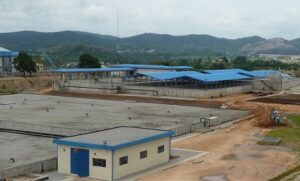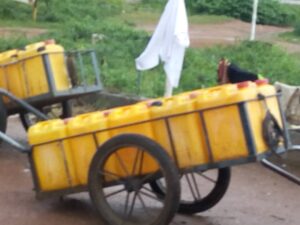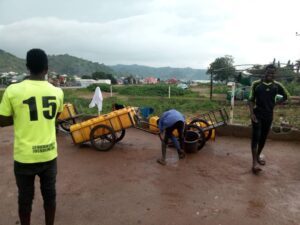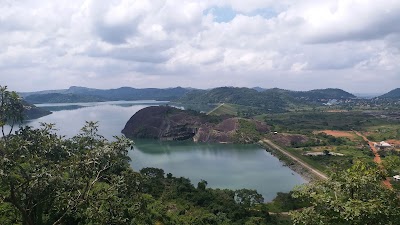Thirst In The Middle Of Water: Abuja’s Lower Usuma Dam host community cry for help
Story from Haruna A YUSUF, Abuja
Bwari Area Council, one of the area councils in Abuja, the Federal Capital Territory (FCT) consists of several towns and villages which include Ushafa, Sabon-Gari, Zango, etc.

The Area Council which has an estimated population of 485,144 using a projection of a 9.3% annual growth rate of the 2006 census figure hosts some federal government facilities like the Joint Admission Matriculation Board (JAMB), Nigeria Law School, and the Lower Usuma Dam Treatment Plant which is made to supply potable water to the FCT.
Regrettably, though, the host community lacks potable water even with the creation of a water board in the town. The residents have to depend on alternative sources of water supply like boreholes and wells for their domestic use and this usually costs them (residents) a lot of money, as most of the inhabitants are civil servants. Most times they are also affected by water-borne diseases such as typhoid and cholera.
In an interview with Neptune Prime’s correspondent, some of the residents expressed their misery.
Imam Abdullkadir Ozekome, one of the residents who live behind the Esu Palace in Bwari, said the situation has impacted negatively on him and his family of 5 as he buys water every two days for domestic use from the mairuwa (water vendor). He said: “I spend money to buy water to drink, bath and wash dirty clothes. I spend not less than 6000 naira monthly and is economically draining.”
READ ALSO: Kano-based teenager builds human-controlled robot (Video)
Another resident, Umaru Muhammed Waziri, said he has been living in Bwari since 1982 and ever since, Bwari has always been affected by a lack of water supply. He said, he dug a well in his house and buys borehole water from a water vendor. “I use well water for domestic work while borehole water is for drinking only. I am appealing to the government to help us provide good drinking water.”

Abdulrahman Yunusa who works with the Federal Capital Territory Administration (FCTA) in Agriculture Department and has been in Bwari since 1994 on the Street named 1616 said then, he was buying water from a water vendor for 300 Naira for 10 gallons every two days but now that he relocated to Daban Avenue, he’s fortunate to have a well, so he won’t spend much compared to where was residing. He further said: ” I have a family of 8 and I must say that the amount I always spend on purchasing water every 2 days can be utilized for something else, sometimes my children do come down with Typhoid fever and since we have no potable water, one may be compelled to think that the water we are drinking may be the cause.”

Alhaji Bala Abdullahi Talle, a staff of the Bwari Area Council in the administration department said it is extremely shameful that there is Lower Usuma Dam here in Bwari and still no potable water supply. He said: “One of my friends that works with JAMB office, two of his children were down with Typhoid and he took them for treatment and I can tell you that the cause of the ailment may not be unconnected to the kind of water we all are drinking”.
“For example, a situation where there are boreholes dug everywhere but you will also see toilet facilities around it, what would you think about such water? Contamination of course, therefore, I’m appealing to the government to come to our aid because one cannot understand why we have a Dam and water board in Bwari yet we do not have a good water supply”.
“However, a source in Bwari Area Council Secretariat told our correspondent that they do patronize the water vendor too when they (staff) need to flush toilets and for performing ablution.
The Hausa Tribal Head of Bwari, Dantani Usman Dan-tsoho, Sariki Hausawa Bwari in the Zango area said: “In my case, I have a borehole in my house but I am just an individual, how about other residents that cannot afford to have one in their houses so I wish to say that one of the primary responsibility of the government is to provide social amenities. Though before the area council election, the Area council helped to fix a public borehole which the Zango community people leveraged, I think the government can do better because the lower Usuma Dam is located in Bwari, therefore, we shouldn’t be having problems of water.”
Neptune Prime sought to know how often the residents visit the Hospital from water-borne diseases cases and Dr Gabriel Ejihson, the Medical Director of Gabic Divine Clinic and Maternity in Sabon-Gari, Bwari said: “To be honest with you the residents of this community do not have access to potable water and as a result, many of the residents are often affected by water-borne illnesses.
“In addition, the Dr said 50-60 per cent of patients that visit his clinic monthly are suffering from one water-borne disease or the other for example, Gastroenteritis, Typhoid, and Cholera.
When asked about safety measures the residents could adopt he said: “They should try to treat the water before drinking”.
According to the United Nations, Goal 6 of the Sustainable Development Goal (SDG) is to ensure the availability and sustainable management of water and sanitation for all and to also achieve Universal and equitable access to safe and affordable drinking water for all, and support and strengthen the participation of the local community in Improving water and sanitation management.
Sequel to the objective of the Sustainable Development Goal (SDG) the reporter found it expedient to speak with the management of the Federal Capital Territory (FCT) waterboard to answer why there is inequitable and inaccessibility of potable water in the FCT but efforts to reach the management proved abortive during the press time.
Follow the Neptune Prime channel on WhatsApp: https://whatsapp.com/channel/0029Va74ZvU2v1IqKByXoX3d
Do you have breaking news, interview request, opinion, suggestion, or want your event covered? Email us at neptuneprime2233@gmail.com


